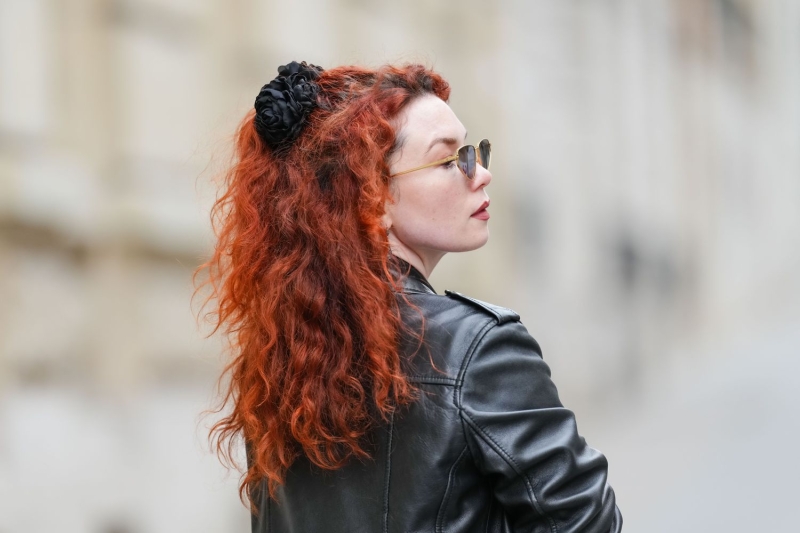Contents
Apple cider vinegar is a go-to kitchen remedy for many. And it clearly delivers on its promises because, despite its pungent smell, it's used time and time again. On the beauty front, apple cider vinegar is known to help level up the health and appearance of hair.
“Apple cider vinegar is an acidic substance, and hair that lacks moisture and shine is often on the more alkaline side of the pH scale,” says Brittany Johnson, a hairstylist and director of brand and content marketing at Mayvenn, a wig and clip-in hair care company. “Apple cider vinegar has been known to help balance the hair’s pH and can aid with reducing brittleness, combating frizz, increasing shine, soothing itchy scalp, and as an overall hair and scalp refresh treatment.” Its benefits for the scalp can not be overemphasized. “When added to a hair-care regimen, it can help support optimal scalp health,” says Kery E. Yates, a trichologist and founder of Colour Collective. “For the scalp, it is a natural antifungal as well as antibacterial and works wonders on soothing the scalp and as a natural remedy for dandruff.”
To learn more about the benefits of apple cider vinegar for hair, we spoke to the pros to lay out everything there is to know.
Benefits of Apple Cider Vinegar for Hair

“Apple cider vinegar, which is often also known as ACV, is created by fermenting apples with acids, minerals, and live cultures,” explains Johnson. “It’s been cited as having benefits for gut health, skin, and hair.” You’re likely to have seen or at least tasted ACV in terms of cooking as it is a kitchen staple, often used for homemade salad dressings as well as as a natural remedy for calming indigestion and more. “It has a pale-to-medium-amber color and is often used as a home remedy for various health conditions due to its purported health benefits,” notes Colin Ford, a hairstylist and education director at Sachajuan.
Apple cider vinegar is a holistic hair health wonder. “It can help remove product buildup and excess oil from the scalp, which may improve the overall health of the scalp and hair,” says Ford. “Plus, the acidity of apple cider vinegar is thought to help balance the pH level of the scalp and hair, which may contribute to healthier hair and scalp conditions, while its antimicrobial properties may help reduce the growth of fungi and bacteria on the scalp, potentially reducing the risk of dandruff.” Yates also notes that apple cider vinegar “does a great job of closing the cuticle down, therefore helping to deliver a smooth, shiny finish to the hair,” she explains.
All this being said, it's important to note that although the anecdotal and IRL benefits of ACV on hair are extensive, there is limited scientific evidence to support them.
Products with Apple Cider Vinegar
How to Use Apple Cider Vinegar In Your Hair-Care Routine
How long you leave apple cider vinegar on your hair depends on whether or not it’s a pure treatment, rinse, or a product laced with the ingredient. Plus, the directions on the label, of course. If you’re using a DIY apple cider vinegar treatment, Johnsson says two to three minutes is sufficient to get the benefits of the natural remedy on your hair and scalp. To reap the maximum benefits? “Use apple cider vinegar after shampooing and removing a bit of excess water from your hair,” she recommends. “This will allow it to truly penetrate, and it won’t be blocked by product buildup.” Devin Graciano, a hairstylist and chief product officer at Goldie Locks, further emphasizes that the state of your strands matters when you use apple cider vinegar on your hair. “Due to the pH of apple cider vinegar and variations of at-home mixing, concentration levels will not be as consistent compared to buying an acidic shampoo or treatment,” he explains. “So it is generally recommended that those with fragile or damaged hair shampoo, condition, then treat in that order, whereas someone with stronger hair may be able to scalp treat with apple cider vinegar prior to the shampoo.”
Another factor to keep in mind is the end benefit you are looking to achieve. “Ultimately, whether you use apple cider vinegar before or after shampooing depends on your hair type, scalp condition, and personal preference,” says Ford. “Some people find that using it before shampooing provides a deep cleanse without stripping the hair, while others prefer to use it as a conditioning treatment after shampooing for added moisture and shine.”
Potential Downsides to Using Apple Cider Vinegar on Hair

“Overuse of apple cider vinegar on hair can actually make hair brittle, dry, and naturally lighten hair color,” says Yates. “Depending on the hair’s texture, it may be beneficial to add a bit of extra conditioner to mid-lengths and ends to enhance slip and shine after using an apple cider vinegar treatment.” It’s also not the easiest to use in its pure form, and the smell can be considered a negative. “The consistency is quite fluid, mimicking water; the liquid viscosity can make it hard to apply and evenly saturate each strand,” she says. “Plus, the physical smell is a bit off-putting; it will dissipate when the hair is dry, but it won't be completely gone and can take upwards of two shampoos to completely go away.”
Ford explains that downsides include scalp irritation or even dryness or damage of hair, but typically, these concerns are due to excessive or misuse. “The acidity of apple cider vinegar can be harsh on the scalp, leading to redness, itching, or burning sensations,” he says. “Also, using apple cider vinegar too frequently or in high concentrations may strip the scalp and hair of natural oils, leading to dryness and potential damage. Additionally, the acidic nature of apple cider vinegar can potentially weaken the hair shaft and lead to breakage, especially if it is used undiluted or left on the hair for an extended period.” Of course, if you believe you may be allergic to apple cider vinegar, avoid using it as a hair treatment in any capacity, and go to a doctor or dermatologist if you experience an allergic reaction to apple cider vinegar.
Its acidic nature can also impact hair color. “It’s possible that apple cider vinegar can lighten hair color or cause brassiness if it's not diluted properly or if it's left on way too long,” says Johnson. “When purchasing products that have apple cider vinegar as an ingredient, make sure they're also being advertised as color-safe.” You also want to track how often you use an apple cider vinegar-based leave-in or treatment if keeping your color salon fresh is a concern. “The acidic nature of apple cider vinegar can help to strip away hair color over time, especially if used in high concentrations or applied frequently,” says Ford.
Frequently Asked Questions
- What is an easy DIY apple cider vinegar hair treatment that I can make at home?
Johnson recommends the following DIY apple cider vinegar rinse: “Mix one part apple cider vinegar with three parts water in a bottle with a nozzle for easy distribution,” she says. “After shampooing and conditioning as normal, remove excess water and apply the mixture to damp hair for two to three minutes, then rinse with cool water.”
Do I need to dilute apple cider vinegar when using it on my hair?
“It's important to adequately dilute apple cider vinegar before you use it and to make sure that you're not using it too often,” says Johnson. “Overuse of apple cider vinegar on hair can lead to brassiness, exacerbating certain skin and scalp conditions and even cause burns.” Ford adds: “After using an apple cider vinegar rinse, apply a small amount of lightweight hair oil or leave-in conditioner to help moisturize and protect hair.”
Can apple cider vinegar help with hair loss?
“There is no proven data for it to help with hair growth; however, by keeping the follicles clean and free from product build-up and excess sebum, follicle fitness is improved, thus leading to the optimal environment for new hair growth,” explains Yates. “In addition, the natural chemistry of apple cider vinegar makes it a super cleanser to eliminate product build-up from both the scalp and hair shaft, which can make the hair appear fuller.”
